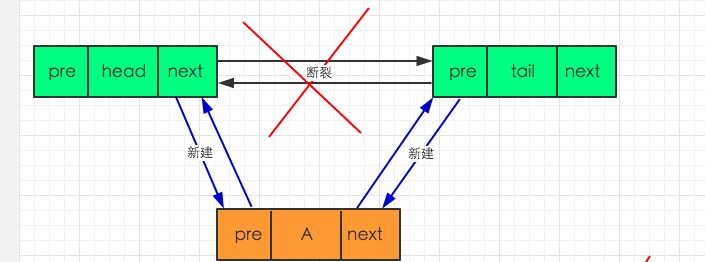Python 实现双向链表(图解)
原文:https://blog.csdn.net/qq490691606/article/details/49948263
git 路径 https://github.com/wangpanjun/datastructure.git
git 路径 https://github.com/wangy8961/python3-algorithms
双向链表
双向链表也叫双链表,是链表的一种,它的每个数据结点中都有两个指针,分别指向直接后继和直接前驱。所以,从双向链表中的任意一个结点开始,都可以很方便地访问它的前驱结点和后继结点
双向链表基本方法实现(Python)
1. 初始化链表
定义节点结构:指针域pre、next和数据域data
为方便操作添加了head和tail节点,初始化时head.next–>tail,tail.pre–>next
"""节点类"""
class Node(object):
def __init__(self, data=None):
self.data = data
self.pre = None
self.next = None
"""初始化双向链表"""
def __init__(self):
"""
设置头尾,操作比较容易
头--(next)--》尾
尾--(pre)--》头
:return:
"""
head = Node()
tail = Node()
self.head = head
self.tail = tail
self.head.next = self.tail
self.tail.pre = self.head

2. 获取链表长度
起始head,每有一个节点,length+1
"""获取链表长度"""
def __len__(self):
length = 0
node = self.head
while node.next != self.tail:
length += 1
node = node.next
return length
3. 追加节点
因为有tail 节点,所以找到tail.pre 节点就好了
"""追加节点"""
def append(self, data):
"""
:param data:
:return:
"""
node = Node(data)
pre = self.tail.pre
pre.next = node
node.pre = pre
self.tail.pre = node
node.next = self.tail
return node

4. 获取节点
获取节点要判断index正负值
"""获取节点"""
def get(self, index):
"""
获取第index个值,若index>0正向获取else 反向获取
:param index:
:return:
"""
length = len(self)
index = index if index >= 0 else length + index
if index >= length or index < 0: return None
node = self.head.next
while index:
node = node.next
index -= 1
return node
5. 设置节点
找到当前节点赋值即可
"""设置节点""" def set(self, index, data):
node = self.get(index)
if node:
node.data = data
return node
6. 插入节点
插入节点需要找到插入节点的前一个节点pre_node和后一个节点next_node(索引index的正负,前一节点不同,需要判断一下),然后将pre_node.next–>node,node.pre->pre_node;next_node.pre–>node,node.next–>next_node
"""插入节点"""
def insert(self, index, data):
"""
因为加了头尾节点所以获取节点node就一定存在node.next 和 node.pre
:param index:
:param data:
:return:
"""
length = len(self)
if abs(index + 1) > length:
return False
index = index if index >= 0 else index + 1 + length
next_node = self.get(index)
if next_node:
node = Node(data)
pre_node = next_node.pre
pre_node.next = node
node.pre = pre_node
node.next = next_node
next_node.pre = node
return node

7. 删除节点
删除节点,也要区分一下索引的正负。找到当前节点的前一个节点pre_node和后一个节点next_node,将pre_node.nex–>next_node即可
"""删除节点"""
def delete(self, index):
node = self.get(index)
if node:
node.pre.next = node.next
node.next.pre = node.pre
return True
return False

8. 反转链表
反转链表的实现有多种方式,比较简单的就是生成一个新的链表--》可以用数组存储所有节点让后倒序生成新的链表
在这里用下面这种方式生产:
可能有点绕
1.node.next –> node.pre;node.pre –> node.next(递归)
2.head.next –> None;tail.pre –> None
3.head–>tail;tail–>head
"""反转链表"""
def __reversed__(self):
"""
1.node.next --> node.pre
node.pre --> node.next
2.head.next --> None
tail.pre --> None
3.head-->tail
tail-->head
:return:
"""
pre_head = self.head
tail = self.tail
def reverse(pre_node, node):
if node:
next_node = node.next
node.next = pre_node
pre_node.pre = node
if pre_node is self.head:
pre_node.next = None
if node is self.tail:
node.pre = None
return reverse(node, next_node)
else:
self.head = tail
self.tail = pre_head
return reverse(self.head, self.head.next)

9. 清空链表
类似初始化
"""清空链表"""
def clear(self):
self.head.next = self.tail
self.tail.pre = self.head

Python 实现双向链表(图解)的更多相关文章
- (转)Python 实现双向链表(图解)
原文:https://blog.csdn.net/qq490691606/article/details/49948263 Python 实现双向链表(图解)双向链表双向链表也叫双链表,是链表的一种, ...
- Cobra —— 可视化Python虚拟机 and 图解python
http://blog.csdn.net/balabalamerobert http://blog.csdn.net/efeics/article/category/1486515 图解python ...
- Python的安装图解
安装步骤: 第一步:打开Python官网:http://www.python.org 第二步:点击Download,下载windows版本 第三步:选择要下载的版本第四步:安装到指定的位置第五步:验证 ...
- python实现双向链表的操作
双向链表 双向链表又叫做双链表,每个节点有两个指针域和一个数据域.prev指针域指向前一个节点,next指针域指向下一个节点.注意,第一个节点的prev指针域指向空值,最后一个节点的next域也是指向 ...
- Robot framework+python安装使用图解版
一.安装包 1.Python2.7(一切的基础,切记安装目录不能有中文不能有空格) 1)python2.7:(python环境):python-2.7.msi 2)setuptools(python包 ...
- python实现双向链表
双向链表 一种更复杂的链表是“双向链表”或“双面链表”.每个节点有两个链接:一个指向前一个节点,当此节点为第一个节点时,指向空值:而另一个指向下一个节点,当此节点为最后一个节点时,指向空值. 实现 c ...
- Python数据结构--双向链表
''' 双向链表包含第一个和最后一个的链接元素. 每个链接都有一个数据字段和两个称为next和prev的链接字段. 每个链接都使用其下一个链接与其下一个链接链接. 每个链接都使用其上一个链接与之前的链 ...
- 数据结构与算法-python描述-双向链表
# coding:utf-8 # 双向链表的相关操作: # is_empty() 链表是否为空 # length() 链表长度 # travel() 遍历链表 # add(item) 链表头部添加 # ...
- Python的双向链表实现
思路 链表由节点组成,先规定节点(Node),包含data和指向下个节点的next 初始化 data当然就是传入的data了,next和prev指向None 添加 分两种情况: 链表为空,那么头节点和 ...
随机推荐
- css3实现漂亮的倒影效果
实际上还有很多CSS新属性并未包含进CSS3官方标准中.-webkit-box-reflect属性就是以谷歌浏览器为代表的Webkit渲染引擎独有的特征.-webkit-box-reflect的作用是 ...
- Spring学习(一)--概述
Spring是什么? 是一个框架,是为了解决企业应用开发的复杂性而创建的框架 是一个框架,是一个轻量级的控制反转和面向切面的容器框架 从大小与开销两方面而言Spring都是轻量的 通过控制反转(IoC ...
- 应用“PUSH推送”的5个真相和5个误区
真相一:用户厌烦的并不是推送功能本身 针对如何看待推送功能这一问题,对1万名用户进行了问卷调查,结果表明80%的用户表示不会拒绝推送功能.各个年龄段方面没有太大的差别,但女性用户更容易受个人兴趣和 ...
- 用于主题检测的临时日志(0ece3f5c-d74f-449c-85a7-ed53fffb0e94 - 3bfe001a-32de-4114-a6b4-4005b770f6d7)
这是一个未删除的临时日志.请手动删除它.(abf5973f-502f-47e6-8825-4dd1c2cdd799 - 3bfe001a-32de-4114-a6b4-4005b770f6d7)
- IOS 获取中英文字符串长度
//得到中英文混合字符串长度 方法1 - (int)convertToInt:(NSString*)strtemp { int strlength = 0; char* p = (char*)[str ...
- IISExpress 开放局域网访问
1. 设置 IISExpress 配置文件 applicationhost.config VS2015 :这个配置文件 在工程目录下的 .vs/config 隐藏目录 其他版本 :在用户目录中的 II ...
- SVM的新理解
svm导出的原始问题然后利用KKT条件,为何还需要对偶空间? 一方面,实际上KKT条件怎么得到的?KKT条件的推导是:svm原始问题->极大极小问题(先算极小这步,但极小这步中α是有约束的,不好 ...
- I.MX6 Ar8031 device register hacking
/***************************************************************************** * I.MX6 Ar8031 device ...
- TX2-start 6 CPU kernel-开启高功耗模式
1.TX2简介 Jetson TX2是由一个GPU和一个CPU集群组成.CPU集群由双核denver2处理器和四核ARM Cortex-A57组成,通过高性能互连架构连接.拥有6个CPU核心和一个GP ...
- [LeetCode&Python] Problem 496. Next Greater Element I
You are given two arrays (without duplicates) nums1 and nums2 where nums1’s elements are subset of n ...
